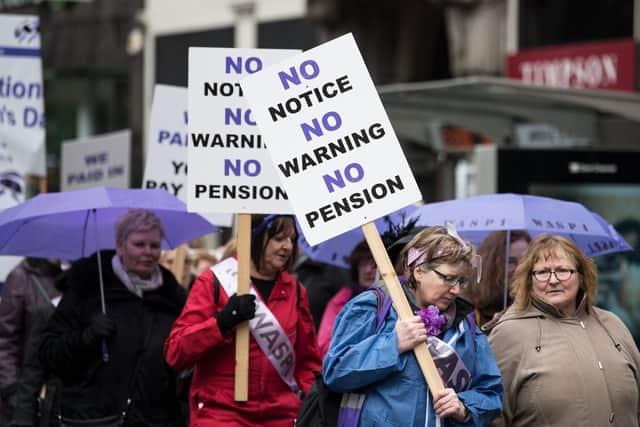Waspi women who lost out in pension age change owed compensation 'potentially totalling billions'
People affected by state pension changes which were not communicated adequately should receive an apology and compensation, potentially totalling billions of pounds, a report has said.
The Parliamentary and Health Service Ombudsman (PHSO) has asked Parliament to intervene and “act swiftly” to make sure a compensation scheme is established.
Advertisement
Hide AdAdvertisement
Hide AdWomen Against State Pension Inequality (Waspi) campaigners said it is now time for supporters to “put their money where their mouth is” with “a proper compensation package”.


The ombudsman said that, to date, the Department for Work and Pensions (DWP) has not acknowledged its failings, nor put things right for those affected.
Responding, the SNP’s Women and Equalities Spokesperson, Kirsten Oswald MP, warned the UK government against ignoring the Ombudsman report into the scandal.
She said: “Women born in the 1950s have been betrayed by the Tory government and deprived of pensions they were entitled to.
“This saga has run on for far too long – it’s time for the UK government to step up and put an end to this serious injustice by issuing an immediate apology and fair and fast compensation to all women who were affected.
"They could also show good faith and an intent to make things right by backing the Private Member's Bill tabled by my SNP colleague, Alan Brown, that would force the government to publish proposals for a compensation scheme.
“If the UK government decides to ignore the report and carry on casting these women aside then Parliament must step in to hold the Tories to account and ensure that these women see justice.
“The SNP has long fought for the government to rectify this shambles and give these women the pension they rightfully deserve, and we will continue to do so.”
Advertisement
Hide AdAdvertisement
Hide AdLib Dem MP Christine Jardine said the women had “already waited far too long for justice”.
She added: “One of the first people who came to me for help seven years ago was a Waspi woman. Parliament needs to step in and act quickly.
"I am disappointed for the women that today is not the end of it.
"This whole saga has been badly managed and they deserved better”.
The ombudsman said that, to date, the Department for Work and Pensions (DWP) has not acknowledged its failings, nor put things right for those affected.
The PSHO used a severity of injustice scale to determine a financial payment that it believes is appropriate and proportionate.
It believes women experienced a significant and/or lasting impact which is level four on the scale, which is between £1,000 and £2,950.
It has given this suggestion to Parliament and it will be up to Parliament to determine a remedy.
Advertisement
Hide AdAdvertisement
Hide AdHowever, MPs insisted the levels of compensation should be higher, up to the higher bracket of level six, which is £10,000 or more.
Peter Aldous, vice-chairman of the state pension inequality for Women All-Party Parliamentary Group (APPG), said “Compensation in line with category six injustice must be agreed by Parliament.”
Labour MP Rebecca Long-Bailey, fellow vice-chairwoman of the APPG, said: “The UK Government must right this historic wrong, and go beyond the recommendations of the Parliamentary and Health Service Ombudsman and deliver fair compensation to these women as a matter of urgency.”
Waspi chairwoman Angela Madden called for a “proper compensation package”.
She said: “The report at least finds that level four compensation is required, but politicians across party lines have previously supported level six – which would far more clearly and reasonably recognises the injustice and loss of opportunities suffered.
“We are now looking to those who have supported us over the years to put their money where their mouth is and back us on a proper compensation package. All the parties are now in the spotlight with Waspi women watching and waiting to see how they should best use their votes in the coming general election.”
The PSHO’s investigation found thousands of women may have been affected by DWP’s failure to adequately inform them that the state pension age had changed.
Its report said: “We recognise the very significant cost to taxpayers of compensating all women affected by DWP’s maladministration.
Advertisement
Hide AdAdvertisement
Hide Ad“Compensating all women born in the 1950s at the level four range would involve spending between around £3.5 billion and £10.5 billion of public funds, though we understand not all of them will have suffered injustice.”
The 1995 Pensions Act and subsequent legislation raised the state pension age for women born on or after April 6 1950. The ombudsman investigated complaints that, since 1995, DWP has failed to provide accurate, adequate and timely information about areas of state pension reform. It found failings in the way DWP communicated changes to women’s state pension age.
In addition to paying compensation, the ombudsman made it clear the DWP should acknowledge its failings and apologise for the impact it has had on complainants and others similarly affected.
A DWP spokesman said: “We will consider the ombudsman’s report and respond in due course, having co-operated fully throughout this investigation.
“The Government has always been committed to supporting all pensioners in a sustainable way that gives them a dignified retirement, whilst also being fair to them and taxpayers.
“The state pension is the foundation of income in retirement and will remain so as we deliver a further 8.5% rise in April which will increase the state pension for 12 million pensioners by £900.”
Downing Street declined to comment on the ombudsman’s report.
The Prime Minister’s official spokesman said: “The Government will now consider the ombudsman’s report and respond to their recommendations formally in due course, and we will also co-operate with the parliamentary process as we have done throughout with the ombudsman.”
Comments
Want to join the conversation? Please or to comment on this article.
